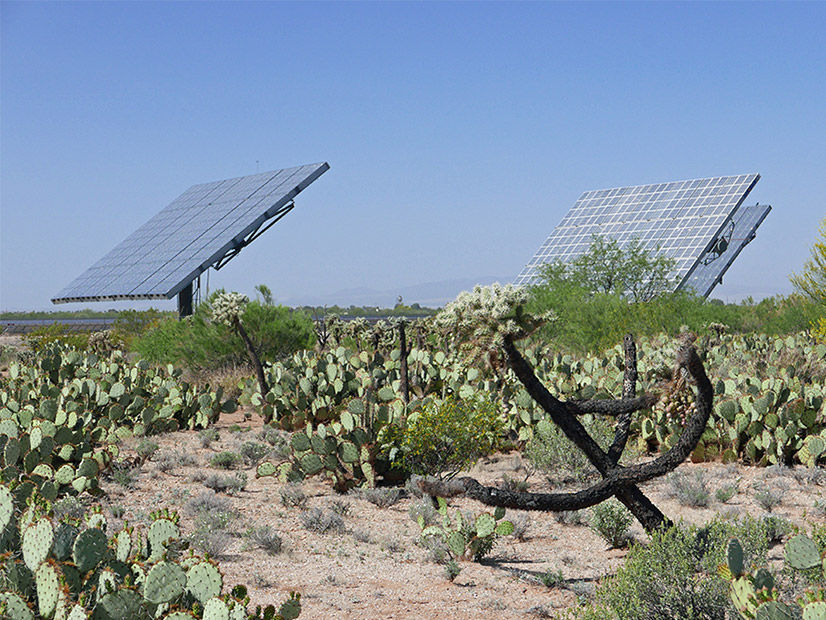Environmental groups continued to react with dismay this week after regulators in Arizona rejected energy rules that would have required state-regulated electric utilities to reduce carbon emissions by 100% by 2050.
The Arizona Corporation Commission rejected the proposed rules by a 3-2 vote on Wednesday after amending them. The amendment changed the requirements in the proposed rules to voluntary goals for the utilities to try to reach.
In a news release sent out Sunday night, Western Resource Advocates said ACC had “failed to help our state reduce the harmful fossil-fuel pollution that causes climate change.”
“Arizona’s major utilities have all said they want the regulatory certainty of a firm emissions reduction standard, and the commission today has failed to provide that,” said Adam Stafford, WRA’s senior staff attorney in Phoenix. “Our state needs strong action and solid standards for reducing the emissions that cause climate change and realizing the economic benefits of clean energy.”
The proposed rules that the ACC considered last week, before they were amended, would have required electric utilities to achieve a 100% reduction in carbon emissions compared to baseline levels by 2050, with interim reductions of at least 50% by Jan. 1, 2032, and at least 75% by Jan. 1, 2040.
The proposed rule also included requirements for energy efficiency and energy storage.
The adoption of the proposed energy rules, including the expansion of energy efficiency, was projected to save Arizonans more than $2 billion, according to a joint news release from the Southwest Energy Efficiency Project, Arizona PIRG Education Fund, and Wildfire: Igniting Community Action to End Poverty in Arizona.
“The commission’s failure to extend and expand Arizona’s very successful energy efficiency standard means ratepayers will not reap increased financial benefits, and businesses will not have regulatory certainty to invest in our state,” said Diane Brown, executive director of the Arizona PIRG Education Fund.
Commissioner Justin Olson (R) proposed the amendment to make provisions of the rules voluntary. Chairwoman Lea Márquez-Peterson (R) and Commissioner Jim O’Connor (R) supported the amendment.
After the amendment was approved, Olson voted against the revised rules.
Commissioners Sandra Kennedy and Anna Tovar, both Democrats, also voted against the revised proposal, saying they could no longer support the energy rules as amended, Tucson.com reported. The amended energy rules died on a 3-2 vote.
In a news release following the vote, the Sierra Club Grand Canyon Chapter called the amendment a “poison pill.”
“Arizonans have repeatedly and frequently voiced their support for transitioning away from fossil fuels that harm our health and the climate to a clean and sustainable energy system, including in communities most impacted by coal plants and their pollution,” said Chapter Director Sandy Bahr. “The commission just did not listen.”
The proposed energy rules were first filed in August 2018. In November 2020, the commission voted 4-1 to begin the formal process to adopt the rules, including the requirement to reduce carbon emissions by 100% by 2050. Márquez-Peterson, who now serves as commission chair, voted in favor of the action.
Following Wednesday’s vote, Márquez-Peterson issued a statement explaining her reasons for supporting the amendment to the proposed energy rules. She said changing the rules from a mandate to a goal for electric utilities was “the best solution to protect ratepayers.”
“While a ‘mandate’ would have essentially given the utilities a blank check to recover any and all costs associated with complying with the rule, a ‘goal’ allows for accountability and flexibility as commissioners evaluate the costs and allows commissioners to strike a balance between meeting the goals in the long-run and protecting ratepayers in the short-run,” she said.
Márquez-Peterson said she was disappointed with the final vote and noted the debate over the energy rules had lasted more than four years, with thousands of hours of public and stakeholder meetings.
“I’m not sure where we go from here,” she said. “However, I’m optimistic that this is not the end and that we can continue to stand with Arizona ratepayers to achieve affordable, reliable and sustainable energy for our state.”





